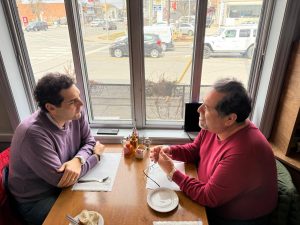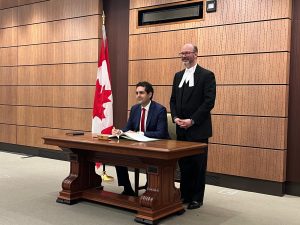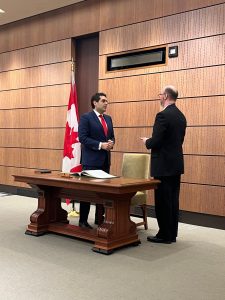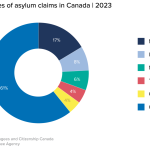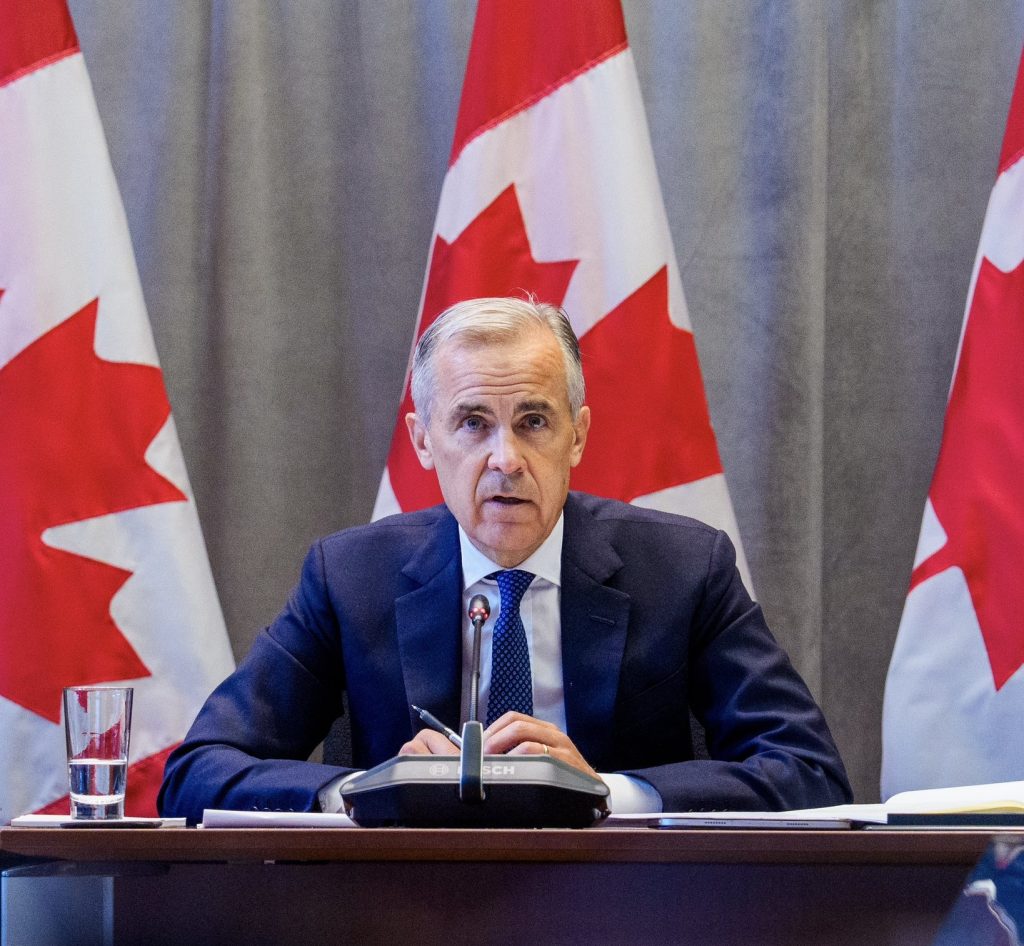
INTERVIEW WITH MP VINCE GASPARRO
OSCAR VIGIL / TORONTO /
It’s been five months since Mark Carney stepped into the role of Prime Minister, leading the Liberal Party into a new chapter of Canadian politics. And while much has unfolded, many Canadians are still asking: what has actually changed?
The Conservative Party remains in disarray. Its popularity continues to slide, and leader Pierre Poilievre faces a pivotal moment in next week’s by-elections. The outcome will determine whether he reclaims a seat in Federal Parliament, or whether voters will send him packing.
Meanwhile, the New Democratic Party (NDP) is adrift. Once a key player in shaping national policy, it now seems more like a political footnote. Its direction is unclear, and its influence has waned.
And what of Prime Minister Carney and the Liberals? That’s the central question. The protracted tariff negotiations with the United States drag on, leaving Canadians bracing for the possibility of economic strain should President Donald Trump escalate trade tensions. The specter of belt-tightening looms large.
Yet Carney’s first months in office haven’t been defined by trade talks alone. Politics -strategic, symbolic, and sometimes chaotic-has been front and center. To unpack the developments and assess the government’s performance so far, we sat down with MP Vince Gasparro, who represents Toronto’s Eglinton-Lawrence riding. With Argentine heritage through his father, Gasparro brings a unique perspective to Parliament, where he serves as Parliamentary Secretary to the Secretary of State for Crime Control.
OV: Reflecting on the first three months of the Liberal government under Prime Minister Mark Carney, how would you assess its performance so far? What positive actions or achievements would you highlight?
VINCE GASPARRO: Canadians sent a strong message by electing our new government, they voted for action and that is exactly what we are delivering. That is why one of our new government’s first actions was delivering a middle-class tax cut, saving families up to $840 per year.
From day one, this government has been laser-focused on tackling the issues that matter most: growing the economy, making life more affordable, and combatting crime while enhancing our national security to keep our communities safe.
One of the largest milestones has been the One Canadian Economy Act, which received Royal Assent on June 26th. This bold step helps break down trade barriers between provinces, creating new jobs. The IMF estimates this move will boost Canada’s productivity by nearly 4%, which means more jobs for Canadians.
We are also taking meaningful steps to help with housing affordability. Removing the GST on new homes for first-time buyers is just the beginning of a broader plan to make homeownership more achievable for more Canadians. We are also building more affordable housing, faster.
Looking ahead, in the fall, we will be introducing bail reform, to ensure repeat offenders can no longer so easily return to our streets on bail. It is a necessary change to help communities feel safe and protected from threats both foreign and domestic.
I am proud to serve under Prime Minister Carney’s leadership as we bring forward transformative changes for our economy, for public safety, and for all Canadians.
OV: What have been the most significant challenges the government has faced during this initial period? And looking ahead, what major challenges do you anticipate in the near future?
VINCE GASPARRO: One of the biggest challenges we have faced in these first few months has been navigating the economic uncertainty, caused by President Trump and his trade war. In addition, global pressures caused by geopolitical instability are having a real impact on Canadians, from household budgets to business confidence. That is why we are taking bold, decisive action to strengthen our economy. There are no quick fixes, but we are moving in the right direction.
Our government is cutting red tape, unlocking our economic potential, and working to bring the provinces together, so Canada can function as one strong, united economy, not thirteen fragmented ones, creating new jobs. People voted for meaningful change, and we are working hard every day to deliver real, tangible improvements.
OV: One of the government’s early legislative efforts, Bill C-2—An Act respecting certain measures relating to the security of the border between Canada and the United States and respecting other related security measures—has been generally well received. However, it has also drawn criticism for potentially infringing on citizens’ rights, particularly regarding privacy in postal correspondence and online activity. What steps can be taken to safeguard these fundamental rights while maintaining national security?
VINCE GASPARRO: Bill C-2 provides law enforcement with the necessary tools to keep our borders secure, combat organized crime, stop the flow of illegal fentanyl, crack down on money laundering, and halt auto thefts. As organized criminals are constantly adapting to new technology and adopting new methods, our national security and law enforcement agencies must be equipped to keep pace.
That said, protecting Canadians’ privacy remains a fundamental priority. The bill focuses on metadata. It does not give access to the actual content individuals are viewing. This is targeted, limited, and necessary to fight the growing threats of organized crime, terrorism, and digital money laundering.
Importantly, the bill also closes a serious loophole. Currently, law enforcement can obtain a warrant to inspect packages from private couriers liked FedEx or UPS, but not from Canada Post. Criminals are well aware of this and have been using the postal system to traffic drugs, including fentanyl. Bill C-2 ensures law enforcement can now seek a warrant to inspect packages sent through Canada Post, bringing parity to how mail is handled across the board.
Safeguarding national security and protecting individual rights are both equally important. Bill C-2 strikes a necessary balance to ensure Canadians remain both safe and free.
OV: The same legislation has also raised concerns about its impact on asylum seekers, particularly due to its retroactive nature, which prevents individuals who have lived in Canada for over a year from applying for refugee status. What message would you like to convey to immigrant communities in light of this measure?
VINCE GASPARRO: Canada has always been a country that welcomes newcomers, and this principle remains at the heart of our immigration system. I come from a family of immigrants – the values of hard work, family, and community instilled in me by my parents and grandparents continue to guide my work.
Bill C-2 aims to protect the integrity of our immigration system by closing gaps in legislation, without undermining the rights of those seeking refuge. I fully understand the concerns raised about the bill’s retroactive provisions. That is why this government is committed to implementing it in a way that is fair, transparent, and compassionate.
To be clear: we remain firmly committed to our international obligations, and no one seeking asylum will be returned to a country where they face persecution, torture, or other serious harm.
Canada received nearly 150,000 claims in 2023, more than our current system can effectively manage. With global conflict and migration patterns shifting rapidly, we must ensure that our system remains responsive, sustainable, and focused on protecting the most vulnerable.
To immigrants and newcomers: you are valued, you are welcome, and your contributions continue to shape Canada’s future. Let us continue working together to build an immigration system that is secure, fair, and grounded in compassion.
OV: While many of the Prime Minister’s early initiatives have received cross-party and public support, one controversial decision has been the proposed increase in defense spending to 5% of Canada’s GDP. Critics argue that these funds would be better invested in addressing domestic issues such as the housing crisis or strengthening the healthcare system, rather than boosting military budgets that largely benefit foreign arms manufacturers. How do you respond to these concerns?
VINCE GASPARRO: That is a great question, and it speaks to the broader shifts in Canada’s global position and the reality of a more dangerous, unpredictable world. The proposed increase in defence spending reflects a shared commitment made by all NATO member states. NATO remains one of Canada’s most important international alliances and a cornerstone of our national security.
The investment is structured in two parts. Three point five per cent will go toward core military spending, while 1.5% will support defence-related infrastructure, phased in over the next 10 years. This is not just about military readiness; it is about building lasting critical infrastructure here at home: ports, bridges, airports, and military housing. These investments will modernize our infrastructure, boost our economy, and reinforce Canada’s sovereignty and national resilience. This is about improving our safety and security while creating high paying jobs here at home.
We have also signed a strategic defence and security partnership with the European Union, called ReArm Europe, which aims to reduce our over-reliance on U.S. suppliers and build stronger trade relationships with European allies. Currently, about 70% of Canada’s military equipment budget is spent on U.S.-made gear; this partnership opens the door to a more balanced and secure supply chain while supporting allied industries.
At the same time, we remain committed to addressing urgent domestic challenges like housing and health care. We can and must invest in both domestic priorities and global readiness, because security at home also depends on stability abroad.
OV: As a Member of Parliament and part of the governing party, how are you experiencing this role so far? Has it met your expectations? And what can the Hispanic and Latin American communities—as well as Canadian society more broadly—expect from your work in the years ahead?
VINCE GASPARRO: It is an incredible honour to serve as a Member of Parliament for Eglinton-Lawrence and to be part of a government that is focused on delivering real, meaningful change. The work is demanding but also deeply rewarding, especially when I see the tangible impact that we are having in people’s lives and communities.
I enjoy being a strong advocate for all Canadians, including the Hispanic and Latin American communities, whose contributions continue to enrich our country in so many ways. You can expect hard work and a relentless focus on results. The is just the beginning, and I look forward to continuing this important work in the years ahead.
OV: Finally, is there anything else you would like to share with our community?
VINCE GASPARRO: I want to sincerely thank our community for its resilience, strength, and ongoing support. Your contributions help shape the future of Canada, and your voice truly matters.
We are living through a time of significant change, and now more than ever, community involvement and civic engagement are essential. I encourage everyone to stay
informed, stay hopeful, and stay active. Together, we can build fairer, safer, and more united Canada.

